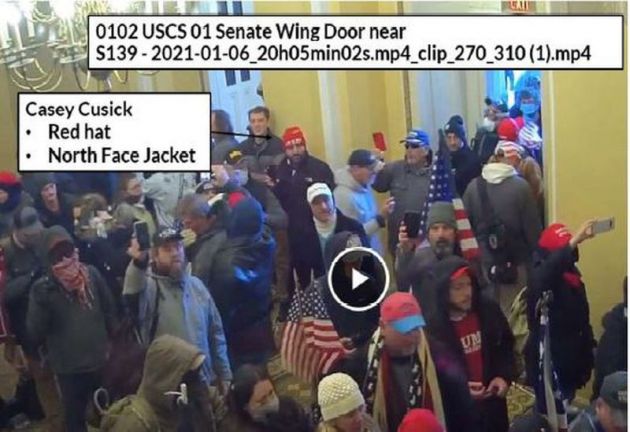Christian nationalism was strong factor on Jan. 6 Washington DC attack, but largely ignored in report

What happened on Jan 6. 2021 in Washington DC when the Capitol was stormed by supporters of Donald trump continues to worry some politicians and faith leaders because one of the planks of many of those attackers was Christian nationalism.
"How we can confront the myths of January 6 and intensifying Christian nationalism," ran a headline in Time, on Jan. 7 2024.
"Indeed, the influence of Christian nationalism among the Jan. 6 rioters was clearly evident in the flags and banners they waved," The Washington Post had written back on Dec. 22, 2022.
Asked by lawmakers to describe those who attacked the U.S. Capitol in 2021, Officer Daniel Hodges of the D.C. police told the U.S. House of Representatives select committee investigating the insurrection that "it was clear the terrorists perceived themselves to be Christians."
Two members of the committee, Democrat, Jamie B. Raskin, and Republican Adam Kinzinger, also independently noted in conversations with the news media the incidence of Christian nationalism.
"Had there not been some of these errant prophecies, this idea that God has ordained it to be Trump, I'm not sure January 6 would have happened like it did," Kinzinger, an evangelical Christian, said on a Christianity Today podcast episode in March, according to The Post.
"In the days before the assault, 'Jericho Marchers,' inspired by the Bible's Book of Joshua, circled Capitol Hill praying for the election results to be overturned. When rioters stormed into the Senate chamber Jan. 6, they huddled in prayer."
Police told the US. House of Representatives select committee tasked with investigating the insurrection that "it was clear the terrorists perceived themselves to be Christians," the Post wrote.
The Jan. 6 attack resulted from a brew of political polarization and economic dislocation fueled by conspiracy theories and nationalist rhetoric, wrote the Pulitzer Center in September 2021.
"But the events of that day also marked a high tide of white Christian nationalism, a longstanding phenomenon in American religious and political history," said the Center.
Molly Olmstead wrote in Slate on Jan. 6, 2024: "It can be hard to keep track of all these movements and groups—Neo-Charismatic Pentecostalism, the NAR, Christian nationalism, and so on—and tempting to write it all off as a matter of right-wing Christians getting worked up for Donald Trump.
"But a new book, focused on the political strategies of Neo-Charismatic Pentecostals, makes the case that to really understand the anti-democratic impulse of some of the Christian right, it's worth examining the segment that believes in a literal battle for the country between the supernatural forces of good and evil—the segment [Speaker of the U.S. House of Representatives Mike] Johnson already has ties to.
The book is American Evangelicals for Trump: Dominion, Spiritual Warfare, and the End Times, penned by André Gagné, professor and chair of the theological studies department at Montreal's Concordia University.
It was first published for a French audience in 2020, and Gagné has recently released an updated version for an English-speaking audience.
Slate spoke to Gagné to better understand how these Neo-Charismatic Pentecostals rallied their religious influence to push an anti-democratic agenda before Jan. 6, and why it matters that politically motivated leaders in this movement still have strong ties to the Republican Party, or GOP.
Asked by lawmakers this year to describe those who attacked the U.S. Capitol on Jan. 6, 2021, Officer Daniel Hodges of the D.C. police told the House select committee tasked with investigating the insurrection that "it was clear the terrorists perceived themselves to be Christians."
Gagné said in the interview: "The New Apostolic Reformation is essentially a new mode of church governance. It's a movement that has, as its core idea, apostolic governance. [That is: churches led by "apostles," people granted leadership authority by God.] It's about dismantling the way churches function democratically, with elders and the congregation voting for their pastor. This nondemocratic impetus at the church level exhibits itself as the idea of 'dominionism' at the social level," he said.
"'Dominionism' is the idea that Christians should exercise authority, that the kingdom of God is to be established here on earth now, and it's the responsibility of Christians to bring that about.
"This is rooted in a particular reading of the book of Genesis chapter one, where God calls humankind to exercise dominion over the universe. And to do that, Christians need to be able to ascend to the top of 'mountains' of culture—religion, politics, education, family, media, and so on," said Gagné.
There is no single definition of Christian nationalism which was touted by apartheid proponents when that racist ideoology was in force in South Africa in the 20th Century,
But Encyclopaedia Brittanica says; "Christian nationalism, ideology that seeks to create or maintain a legal fusion of Christian religion with a nation's character. Advocates of Christian nationalism consider their view of Christianity to be an integral part of their country's identity and want the government to promote—or even enforce—the religion's position within it."